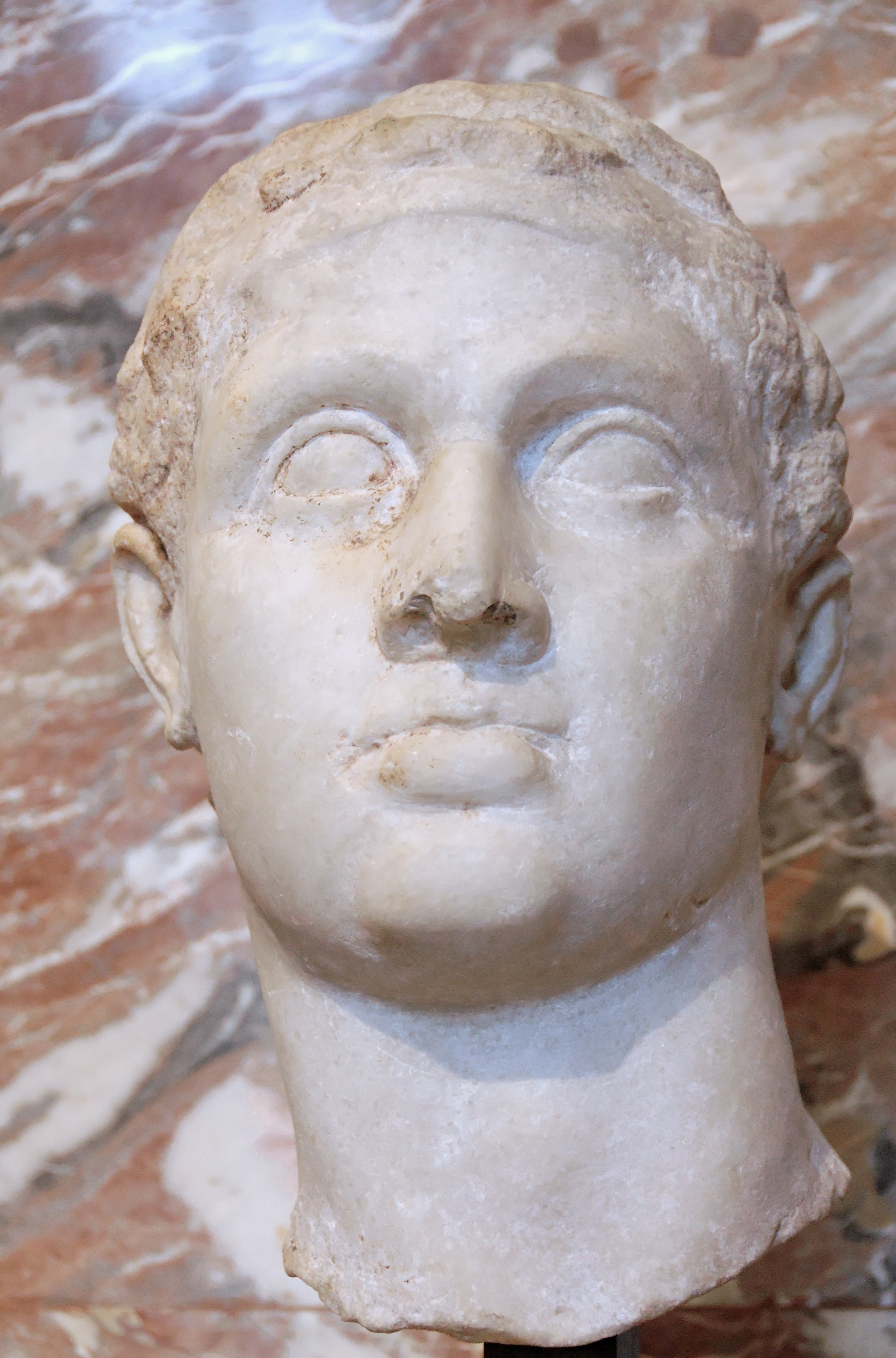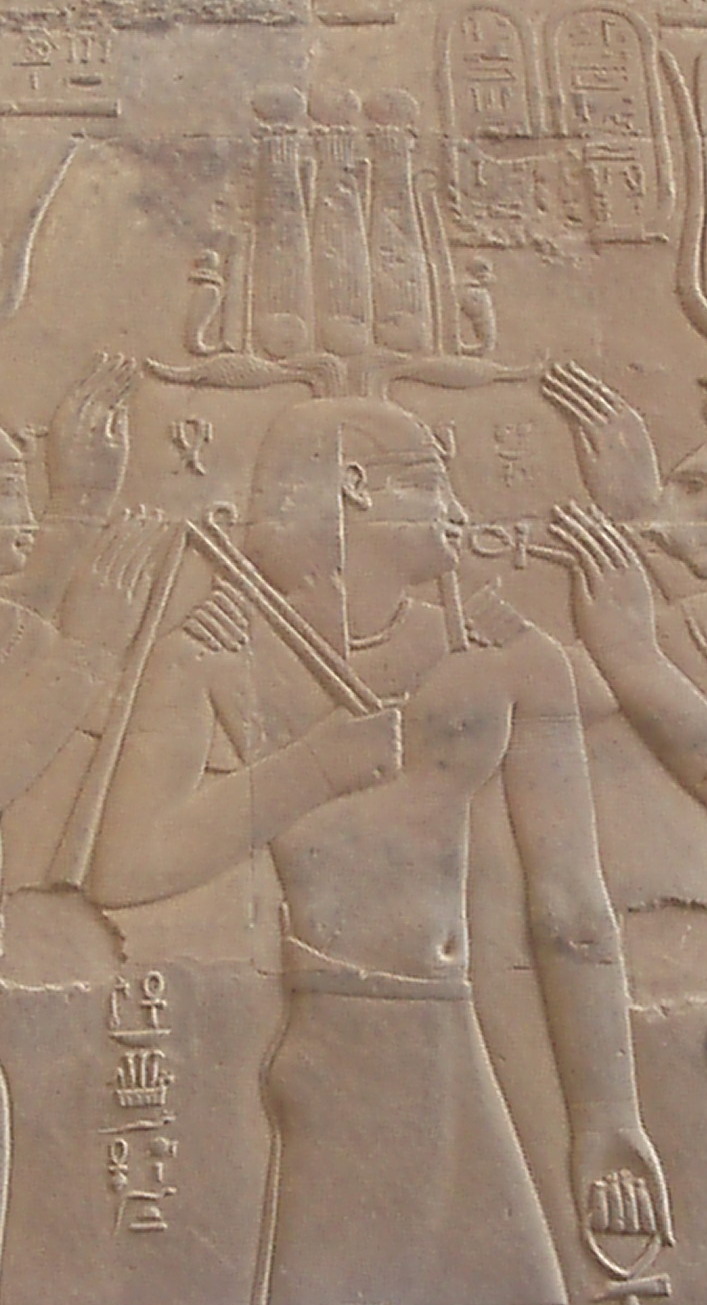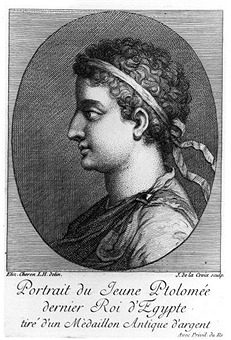1. Overview
Ptolemy XIII Theos Philopator (Πτολεμαῖος Θεός ΦιλοπάτωρGreek, Ancient, Ptolemaĩos Theós Philopátōr), whose name means "Ptolemy, God Beloved of his Father," was a pharaoh of the Ptolemaic Kingdom of Ancient Egypt, reigning from 51 BC until his death on January 13, 47 BC. He was one of the last rulers of the Ptolemaic dynasty, which governed Egypt from 305 to 30 BC. His reign was marked by a significant power struggle with his elder sister and co-ruler, Cleopatra VII, which escalated into a civil war. This conflict drew in the powerful Roman general Julius Caesar, whose intervention ultimately led to Ptolemy XIII's defeat and demise, further solidifying Rome's growing influence over Egypt.
2. Early Life and Family
Ptolemy XIII Theos Philopator was born around 62 BC or 61 BC, the son of Ptolemy XII Auletes, who ruled Egypt from 80-58 BC and again from 55-51 BC. He was part of the Ptolemaic dynasty, a Hellenistic royal family that descended from Ptolemy I Soter, a general of Alexander the Great. Ptolemy XIII had several siblings, including his elder sisters Berenice IV, Cleopatra VII, and Arsinoe IV, as well as a younger brother, Ptolemy XIV.

3. Reign and Power Struggle
Ptolemy XIII's reign was characterized by intense internal conflicts and the increasing entanglement of Egypt in Roman politics, ultimately leading to his downfall.
3.1. Accession and Co-rule
In the spring of 51 BC, at the age of 11, Ptolemy XIII succeeded his father, Ptolemy XII Auletes, as pharaoh of the Ptolemaic Kingdom. His father's will stipulated that Ptolemy XIII should marry his older sister, Cleopatra VII, and that they would rule jointly as co-rulers. Initially, Cleopatra held significant influence, with her face appearing on minted coins, while Ptolemy XIII's name was sometimes omitted from official documents. In October 50 BC, Ptolemy XIII was formally promoted to senior ruler alongside Cleopatra, though real power was wielded by his regent, the eunuch Pothinus.
3.2. Regency and Political Intrigue
As Cleopatra VII's status as queen grew, Ptolemy XIII and Pothinus, along with other court officials like the general Achillas and the rhetorician Theodotus of Chios, became increasingly resentful of her influence. In the spring of 48 BC, this faction, led by Pothinus, attempted to depose Cleopatra. Their aim was to establish Ptolemy XIII as the sole ruler, with Pothinus acting as the power behind the throne. This political maneuvering ultimately forced Cleopatra to flee Egypt.
3.3. Civil War
Ptolemy XIII and Pothinus successfully compelled Cleopatra VII to seek refuge in Roman Syria. However, Cleopatra quickly organized her own army and returned to Egypt, initiating a civil war. The situation was further complicated when their other sister, Arsinoe IV, also claimed the throne, aligning herself with Ptolemy XIII's faction and further escalating the conflict within the royal family.
4. Roman Intervention
The ongoing civil war in Egypt coincided with a critical period in Roman internal politics, drawing powerful Roman figures into the Ptolemaic power struggle.
4.1. Pompey's Asylum and Assassination
At this juncture, the defeated Roman general Pompey the Great, having lost the Battle of Pharsalus to his rival Julius Caesar during Caesar's Civil War, fled to Egypt seeking asylum. Ptolemy XIII and his advisors initially pretended to accept Pompey's request for refuge. However, fearing Caesar's wrath and hoping to gain favor with the victorious Roman general, Ptolemy XIII's advisors, primarily Pothinus and Achillas, orchestrated Pompey's murder. On September 29, 48 BC, Pompey was assassinated by Achillas and Lucius Septimius shortly after arriving in Alexandria.
4.2. Julius Caesar's Intervention
When Julius Caesar arrived in Alexandria on October 4, 48 BC, pursuing Pompey, he was presented with Pompey's severed head. Contrary to the expectations of Ptolemy XIII's faction, Caesar reacted with profound disgust and sorrow, reportedly weeping. He ordered that Pompey's body be located and given a proper Roman funeral, demonstrating his disapproval of the assassination. Meanwhile, Cleopatra VII, having secretly returned to Alexandria, proved far more successful in winning Caesar's favor and soon became his lover. Caesar, acting as an arbiter, arranged for the execution of Pothinus and officially reinstated Cleopatra VII to the throne as co-ruler with Ptolemy XIII, despite her never having officially abdicated.
5. Military Conflicts and Demise
Ptolemy XIII's refusal to accept Caesar's arbitration led to direct military confrontation with Roman forces and his ultimate defeat.
5.1. Siege of Alexandria
Still determined to depose Cleopatra VII and resist Roman influence, Ptolemy XIII allied himself with Arsinoe IV. Together, they organized the factions of the Egyptian army loyal to them against Cleopatra VII and the relatively small contingent of Roman soldiers that had accompanied Caesar to Egypt. The ensuing conflict erupted into fierce urban warfare in mid-December 48 BC, primarily within Alexandria itself. This siege caused serious damage to the city. During this period, parts of the renowned Library of Alexandria were reportedly burned, though the exact extent of the damage and the cause remain subjects of historical debate.
5.2. Battle of the Nile
The stalemate in Alexandria was broken with the arrival of Roman reinforcements from Pergamum. This influx of fresh troops allowed Caesar and Cleopatra's forces to launch a decisive offensive. The climactic engagement, known as the Battle of the Nile (47 BC), occurred in the Nile Delta region. The combined armies of Caesar and Cleopatra VII achieved a decisive victory, routing Ptolemy XIII's forces and forcing him to flee the city.
5.3. Death
Ptolemy XIII's escape attempt proved fatal. He reportedly drowned in the Nile River on January 13, 47 BC, during the chaotic retreat of his defeated army. Historical accounts vary on the exact circumstances of his death; some suggest he was attempting to cross the river to escape, while others indicate he might have been seeking negotiations. An alternative theory posits that he drowned because the weight of his armor prevented him from surfacing after falling from a boat.

6. Aftermath and Succession
Ptolemy XIII's death brought an end to the civil war and reshaped the Ptolemaic succession under Roman oversight.
6.1. Cleopatra VII's Consolidation of Power
With Ptolemy XIII's death, Cleopatra VII remained the unchallenged ruler of Egypt. To maintain the tradition of co-rule and satisfy Egyptian customs, she appointed her younger brother, Ptolemy XIV, as her new co-ruler. However, Ptolemy XIV held little actual power, serving primarily as a nominal figurehead.
6.2. End of the Ptolemaic Dynasty
Cleopatra VII's reign, supported by her alliances with Roman leaders like Julius Caesar and later Mark Antony, marked the final chapter of the Ptolemaic dynasty. After her defeat by Octavian (later Augustus) at the Battle of Actium in 31 BC and her subsequent suicide in 30 BC, Egypt officially became a Roman province. This event marked the definitive end of the Ptolemaic Kingdom and centuries of independent pharaonic rule in Egypt.
7. Cultural Depictions
Ptolemy XIII's dramatic life and his involvement with prominent Roman figures have led to his portrayal in various forms of media across different eras.

He appears in George Frideric Handel's 1724 opera Giulio Cesare in Egitto (Julius Caesar in Egypt), which dramatizes the events of Caesar's intervention in Egypt. George Bernard Shaw's play Caesar and Cleopatra also features Ptolemy XIII as a character. In film, he was portrayed by Richard O'Sullivan in the 1963 motion picture Cleopatra, starring Elizabeth Taylor as Cleopatra VII.
On television, Ptolemy XIII and his conflict with Caesar and Cleopatra for control of Egypt are depicted in the HBO TV series Rome, specifically in the episode "Caesarion". More recently, Ptolemy XIII's civil war with Cleopatra is a significant plot point in the 2017 historical video game Assassin's Creed Origins. In the game, he is presented as a weak puppet ruler manipulated by the "Order of Ancients," who drive him to depose his sister. The game's narrative culminates in his death by drowning in the Nile, where the protagonist, Aya, holds back from killing him as his boat is attacked by crocodiles, causing him to fall into the river.